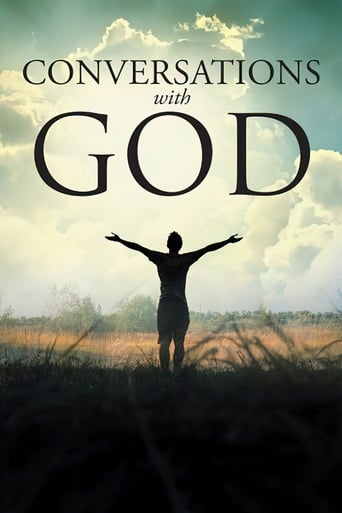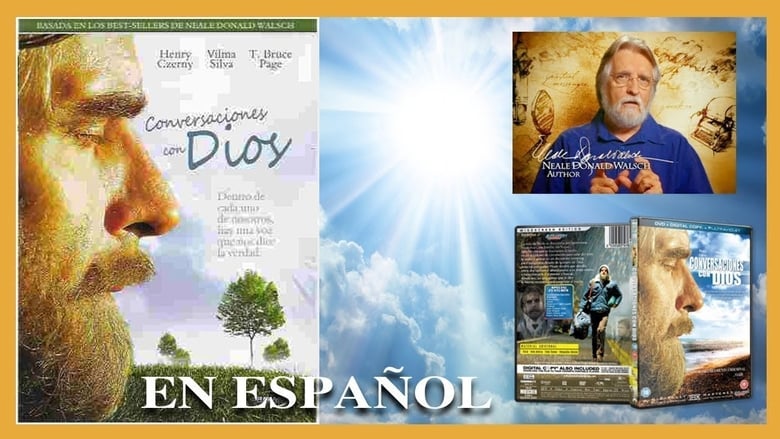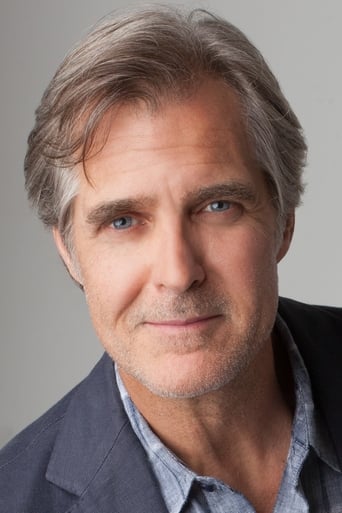Conversations with God (2006)
"Conversations with God" is the true story of Neale Donald Walsch that inspired and changed the lives of millions. The journey begins after he unexpectedly breaks his neck in a car accident and loses his job.
Watch Trailer
Cast


Reviews
Touches You
Slow pace in the most part of the movie.
Purely Joyful Movie!
Absolutely Fantastic
this is supposed to be the type of movies that i like but...unfortunately, fails to click. I find some of the good stuff that happens 'too good to be true' for someone of his situation (maybe the movie should make it more realistic) , the 'conversation' too cheesy at times, & i wasn't convinced in the last scene where he had to answer a difficult question posed by a bystander...I DO NOT BELIEVE that answer at that last scene is 'qualified' enough to be one that god would have said himself. It actually sounds to me like a person who finds DEATH as a solution to everything will present an answer like that. God would have said something much better and befitting to his wisdom. I don't know if this is really based on something that really happened, and i don't know how close this movie is to the book, but this movie, to me , did not do its job nicely.
Simply put, hedonism cloaked in spirituality. My wife checked out this film out of curiosity in the title. We found that this bland movie was both boring and offensive. It has a decent cast who seem to have been given a novice scriptwriter and director. Editing is confusing, with segue-ways that are all but non-sensical. It plays like a Hallmark production with its glossy soft light colors and its message is horrible. I can't help but feel that this film is a way for Walsch (the author of the books the movie is based on) to justify why he had so many broken relationships and has so much wealth. The movie does not make his case well. His spirituality is self-serving. He claims no transcendence and therefore no meta-narrative to existence. According to him, there is no responsibility to others other than just doing a nice gesture every now and then. When "god" supposedly tells him to only do what he loves, I wanted to ask him to make that statement in poverty stricken countries where people have little choice to do anything except what they can to survive. And in the meantime, he lives cosily cushioned by his wealth. He was probably more in tune with himself when he was homeless. The author's form of spirituality could only have come from an economically fat and spiritually active society like the USA. We Americans are so spoiled by our wealth and freedoms that we think we can make God who we want him to be. But the living God is above our petty perceptions of Him. Most of the poor around the world would hate teachings like what Walsch gives. On top of this, the movie falls flat on a technical level. I have not read the books and I definitely have no intention of wasting my time doing so. What we need to change the world is a truth that humbles us. Read the Bible if you want to know what that is. Now there is a book that has truly transformed our world.Blessings.
I watched this on my satellite TV's VOD and thank goodness it cost just under a dollar. I was expecting more from supposedly an inspirational story and instead got a third-rate attempt at a movie.I love stories in which down-and-out people work there way out of their situation, but this one was just weird. The movie was disjointed and confusing and oftentimes, it just left me with more questions, especially about what Walsch's history was like. I believe there are significant omissions from the film, including about his troubles with women and such.I'm generally against Christianity and well, this film got me no closer to that awful religion. Save yourself 1.5 hours of your life and skip this turkey.
For the millions of readers of Neale Donald Walsch's superb trilogy, "Conversations with God" and his sequel, "Tomorrow's God," this film might have special meaning. It chronicles in dramatic form, highlights from Author Walsch's rise from a struggling wannabe to a best-selling writer. I've no idea how much of this is fact and how much dramatic license that Scriptor Eric DelaBarre took in fashioning his screenplay. However, I'm sure that structurally he spent too much time with Neale's rags and not enough with the transition to riches.For over an hour our hero struggles bitterly, becoming an outcast homeless person. Then rather abruptly he's getting his writing inspiration and turning into a great success. This imbalance is probably because Eric saw the poverty part as more dramatic and emotion-driven.Still, for those unfamiliar with Walsch and his writings, the movie may come off as not too interesting. Only when one is familiar with the writing product (for myself, the books should be included in "Great Books of the Western World" Series) that the bio takes on special meaning.Fortunately, fine Canadian actor Henry Czerny is cast in the lead role. (Who can forget his mesmerizing performance in "Boys of St. Vincent"?) Yet, Czerny can't save the tedium of DelaBarre's script.As for the film title, it has little to do with the book per se (how can one make a film of a book that consists entirely of dialog . . . Qs&As?).In the end, it's appropriate that the film be judged as film and, according to that criteria, it deserves a less that satisfactory rating.







